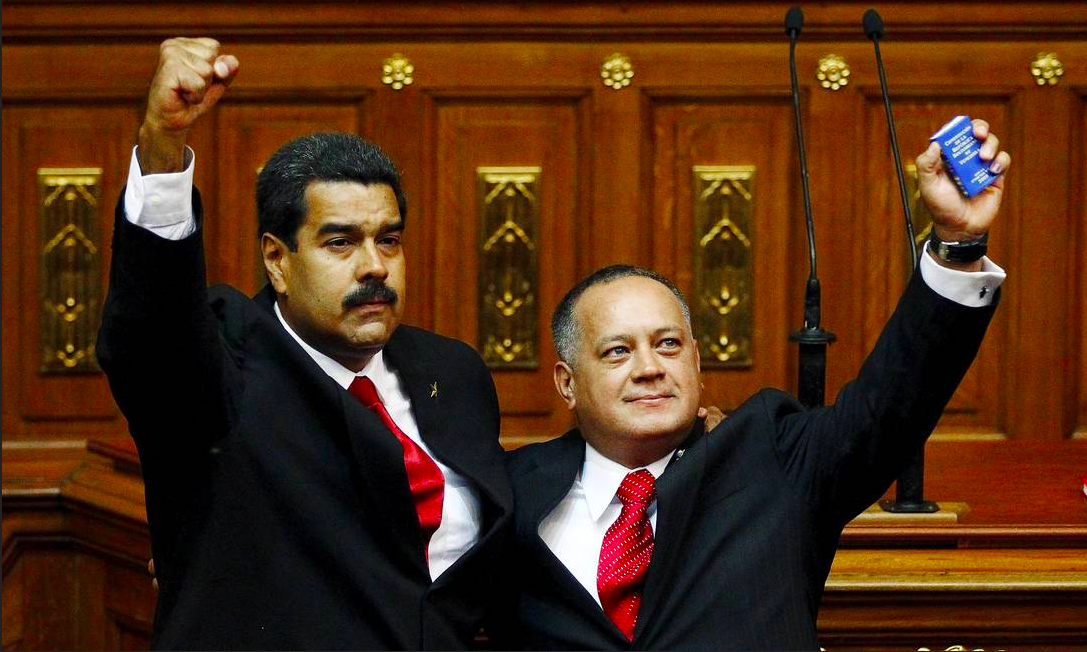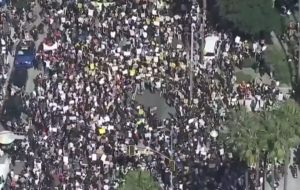
Published 09/16/2024 14:29 | Edited 09/16/2024 14:38
On Saturday night (14), Venezuela’s Minister of the Interior, Justice and Peace, Diosdado Cabello, announced the discovery and dismantling of a conspiracy to destabilize the country and attack government representatives. The plan, according to Cabello, was orchestrated by the United States, with the support of Spain, and included the hiring of mercenaries to assassinate President Nicolás Maduro, Vice President Delcy Rodríguez, and the minister himself. “They hired mercenaries from Eastern Europe, Americans, who are trying to attack Venezuela,” Cabello said in an interview with Telesur.
The minister revealed that the group involved was arrested and presented a batch of 400 seized weapons, including rifles and pistols, allegedly from the United States. The weapons were allegedly transported in containers disguised as legal cargo, such as dog food, and assembled by internal groups responsible for equipping the mercenaries. Among those detained are US soldier Wilber Joseph Castañeda, suspected of leading the operation, as well as two other US citizens, Estrella David and Aaron Barren Logan, accused of planning cyber attacks.
Two Spaniards, José María Basoa and Andrés Martínez, were also arrested, accused of recruiting mercenaries and planning assassinations of Venezuelan leaders. A Czech national, identified as a mercenary, was arrested with documents that, according to Cabello, link the Venezuelan opposition to the plot. He highlighted the names of opposition figures such as María Corina Machado, Julio Borges, and Carlos Vecchio as part of the communications seized with the group.
The governments of the United States and Spain spoke out on Sunday (15), denying Cabello’s accusations. The US State Department called the allegations “categorically false”, while the Spanish government confirmed the detention of the two citizens, but denied any involvement of its intelligence services.
The conspiracy joins a long list of plots denounced by the governments of Hugo Chávez and Nicolás Maduro over the past two decades. The inclusion of Spain’s National Intelligence Center (CNI) as part of this alleged plot marks a new development, with Cabello claiming that the arrested Spaniards have confessed to their participation in the plan to assassinate Venezuelan government leaders.
Cabello promised to act rigorously and said he will use all mechanisms to repel and defeat the mercenary groups, ensuring that peace and security in Venezuela will be maintained.
The arrest of those involved comes amid rising tensions between Venezuela, the United States and Spain, aggravated by recent sanctions imposed by the United States and the symbolic recognition by the Spanish Congress of a rival of Maduro as president-elect of Venezuela.
This new diplomatic crisis promises to increase pressure on the government of Nicolás Maduro, which already faces a series of internal and international challenges.
Seven blows and many conspiracies defeated
There are many indicators that the group led by María Corina Machado had already structured a “plan B” even before the elections in Venezuela. If victory at the polls was not achieved, the alternative would be a destabilization operation and coup, a strategy that has already been repeated several times in the country.
Since Hugo Chávez came to power in 1999, Venezuela has seen seven coup attempts, including the coup of April 11, 2002, which briefly ousted Chávez for 48 hours. Chávez’s triumphant return to power on April 13 cemented a popular saying in the country: “After eleven, there is always thirteen,” meaning that after a coup there is a popular reaction that defeats it.
This motto has become even more relevant in light of recent events, when Chavismo has once again responded to violent demonstrations promoted by far-right groups. Since Monday morning, opposition members have set up blockades across the country, known locally as “guarimbas,” with more than 60 outbreaks of violence recorded as of Tuesday morning. These blockades, which aim to paralyze the country and further undermine Nicolás Maduro’s government, have included the closure of important roads, such as access to the airport, as well as attacks on Chavista institutions and symbols.
In recent days, statues of Hugo Chávez have been toppled and public buildings have been targeted in attacks, in an escalation reminiscent of similar episodes of violence in other countries, such as the invasions of the US Capitol on January 6, 2021. The tactic of guarimbas gained strength in 2017, becoming a central tool of the far right to provoke government repression, increase international pressure and, ultimately, promote a coup d’état against Maduro.
There is a long history of US attempts to interfere in governments that challenge its hegemony, especially in Latin America, and now especially in Venezuela. From Efraín Ríos Montt’s Guatemala to Augusto Pinochet’s Chile to Jorge Rafael Videla’s Argentina, the pattern is clear: when US economic and strategic interests are at stake, the defense of democracy seems to take a back seat.
From the Bush administration’s support for a failed coup in 2002 to the sanctions imposed by the Trump administration and the recent attempt to recognize Juan Guaidó as interim president, this stance is seen by many as part of an ongoing effort to destabilize Venezuela, which has the world’s largest oil reserves and leaders who defy capitalism and U.S. interests.
As former FBI Director Andrew McCabe revealed, in a 2017 meeting with intelligence officials, Trump asked why the US was not at war with Venezuela, when “they have all this oil and it’s right in our backyard.”
Imagine what the reaction in the United States would be if the Venezuelan government were involved in an operation to kidnap the American president. It would be headline news in all major media outlets, with the political and media elite clamoring for retaliation. The debate over national security would gain momentum, and the military response would be immediate, probably with actions against Venezuela.
Failed coup attempts are perennial. One scandalous example occurred in May 2020, when two former American special forces soldiers, Luke Denman and Airan Berry, were captured while trying to smuggle themselves into Venezuela. They confessed on camera that they were part of a conspiracy to kidnap President Maduro. That same day, a video recorded in the United States revealed the men’s connection to a private security company allegedly involved in a plot to remove Maduro from power.
Two days after the incident, the US Foreign Minister held a press conference to deny the Trump administration’s direct involvement in the operation. He joked that if they had been behind the action, the outcome would have been different, a statement that sounded more like a provocation than a firm denial.
Venezuelan authorities described the operation as a “botched landing” on Chuao beach. Videos released at the time showed the men confessing their intention to capture Nicolás Maduro, and showing links to the private security firm Silvercorp USA, run by Jordan Goudreau, a former US soldier.
The Trump administration has pursued an aggressive sanctions policy against Caracas, even during the COVID-19 pandemic. Despite international calls, including from Pope Francis and the UN High Commissioner for Human Rights, to lift sanctions and allow Venezuela to address the health crisis, the US has maintained its strategy of maximum pressure.
Tensions between Venezuela and the United States, historically heightened by political and economic issues, reveal that the interests at stake go beyond any false concern for democracy and human rights. Venezuela, which holds the largest oil reserves in the world, has been the target of destabilization actions encouraged by Washington, often under the justification of regime change.
The case of the failed 2020 operation and the media silence that followed demonstrate how the United States treats its international relations asymmetrically, especially when oil is at stake. Venezuela’s future remains uncertain, but Washington’s hostility toward Chavismo seems to be a constant, while the Venezuelan people continue to pay the price of sanctions and instability.
Source: vermelho.org.br

